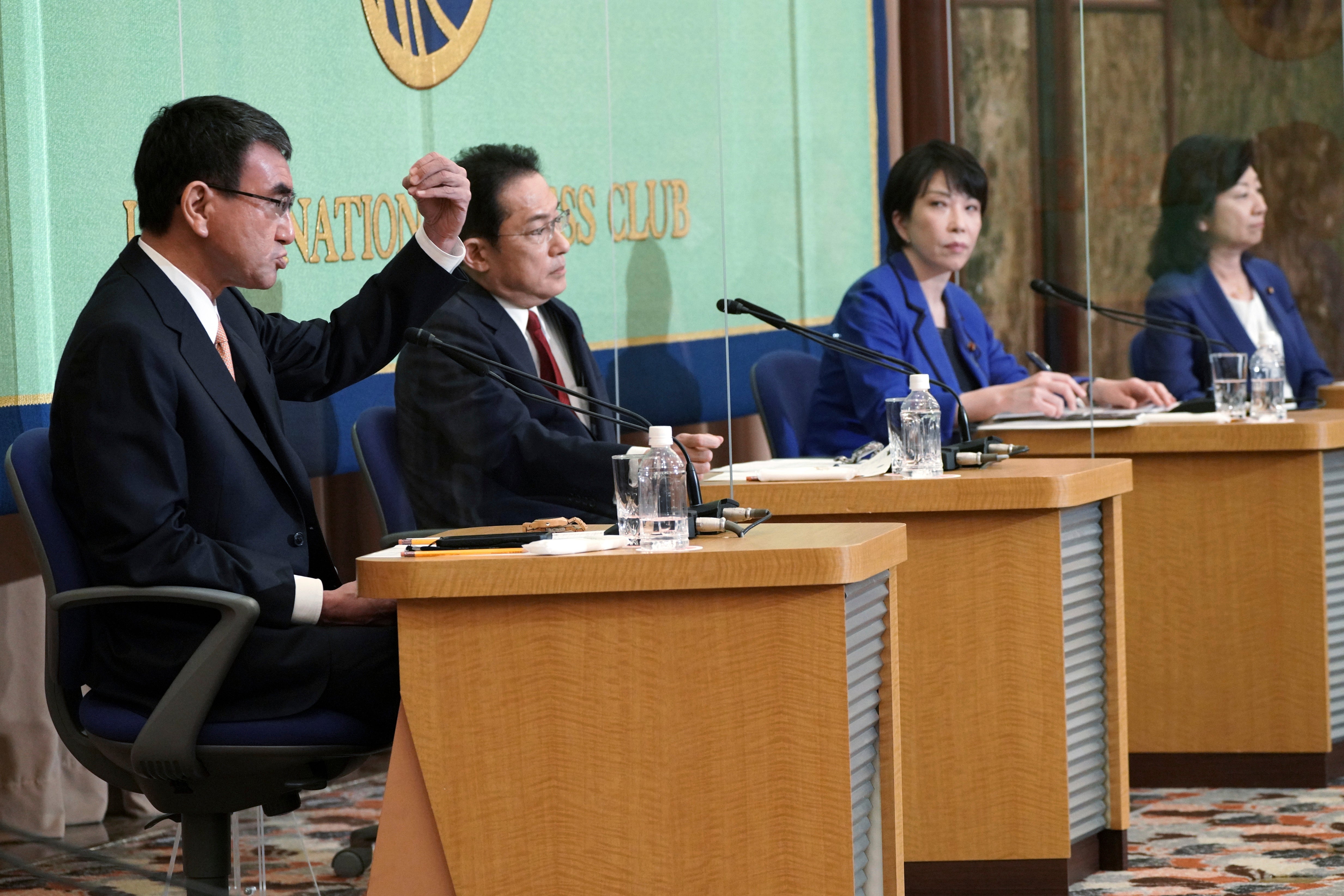China, pandemic, energy top Japan's leadership race debate
Four candidates vying to lead Japan’s governing Liberal Democratic Party _ and replacing outgoing Prime Minister Yoshihide Suga _ have held their first main debate

Your support helps us to tell the story
From reproductive rights to climate change to Big Tech, The Independent is on the ground when the story is developing. Whether it's investigating the financials of Elon Musk's pro-Trump PAC or producing our latest documentary, 'The A Word', which shines a light on the American women fighting for reproductive rights, we know how important it is to parse out the facts from the messaging.
At such a critical moment in US history, we need reporters on the ground. Your donation allows us to keep sending journalists to speak to both sides of the story.
The Independent is trusted by Americans across the entire political spectrum. And unlike many other quality news outlets, we choose not to lock Americans out of our reporting and analysis with paywalls. We believe quality journalism should be available to everyone, paid for by those who can afford it.
Your support makes all the difference.Four candidates vying to lead Japan s governing Liberal Democratic Party — and replacing outgoing Prime Minister Yoshihide Suga — held their first main debate on Saturday, discussing plans to tackle key issues such as China the COVID-19 measures, the pandemic-hit economy and climate change and energy.
The vote will be held on Sept. 29.
The contenders include front-runner Vaccinations Minister Taro Kono former Foreign Minister Fumio Kishida, as well as two female candidates — an ultra-conservative former Internal Affairs Minister Sanae Takaichi and former Gender Equality Minister Seiko Noda, a diversity supporter.
Here's a look at some of the candidates' views on key policy issues debated at the Japan National Press Club in Tokyo:
CHINA, TAIWAN
Kono, who has served as foreign and defense ministers, said a possible conflict cannot be ruled out amid China's growing assertiveness in the region and rising tensions over Taiwan a self-ruled island China considers as its renegade province to be annexed by force if necessary. He said that Japan wants to use its security alliance with the United States and partnerships with Europe and other democracies to prevent Beijing from taking military action. He said Japan-China ties are also about the economy and people exchanges that require “tough diplomacy.”
Kishida said “summits and high-level dialogues are key" for a peaceful settlement of the Taiwan issue and plans to work with like-minded countries to counter Beijing's “authoritarian approach.”
Takaichi, an anti-China hawk who shares former leader Shinzo Abe's nationalistic views and historical revisionism, proposed compiling a contingency plan based on a worst-case scenario over a possible China-Taiwan conflict.
Noda said Japan is a regional lynchpin for Taiwan's stability and U.S.-China tensions over trade, technology and human rights. She said Japan should pursue “pacifist” diplomacy based on lessons learned from its World War II defeat.
KOREAS
Kishida, as former foreign minister, urged Seoul to take the first step to resolve a row stemming from South Korean court rulings that ordered Japanese companies to pay compensation to Korean wartime laborers.
On North Korea, Kishida said he would coordinate with President Joe Biden on steps to denuclearize the Korean Peninsula, while seeking other avenues, including talks with the North Korean leader, to resolve the issue of Japanese citizens abducted to the North decades ago.
Kono said he would step up missile deterrence and intelligence gathering under the Japan-U.S. security alliance. He too would seek a summit with Kim Jong Un to resolve the abduction issue, a major obstacle between the two countries with no diplomatic ties.
ENERGY
Kono said energy conservation, minimizing fossil fuel and bolstering renewables were his main strategy to achieve carbon neutrality by 2050. If that's insufficient, safely restarting nuclear reactors is unavoidable, he said. Kono said the nuclear industry doesn't have much future, and supported phasing out nuclear plants. He opposes Japan's insistence on nuclear fuel cycles that involve spent fuel reprocessing — the main cause of Japan's plutonium stockpile.
Kishida supported the fuel recycling as a way of delaying a final repository, but Kono said the disposal of massive radioactive waste “is a problem whoever becomes prime minister must tackle.”
Takaichi proposed underground compact fusion reactors as a safer and environmental option. Noda believes in geothermal power generation, as well as other renewables such as hydrogen and offshore wind power as part of the ongoing 20 trillion yen ($180 billion) clean energy project over the next decade.
ECONOMY
Kono said Abe's signature “Abenomics” policy only profited major companies but failed to increase income, and that he will address the problem by giving corporate tax incentives to companies that raise salaries.
Kishida said he will introduce (asterisk)new capitalism(asterisk) of growth and distribution to narrow the disparity caused by Abe's approach and worsened by the pandemic.
Takaichi said she will promote robotics and quantum computer development as Japan's future growth strategy.
COVID-19
As vaccinations minister, Kono proposed use of digital technology to monitor conditions of COVID-19 patients recuperating at home, while introducing quick test kits for early detection and isolation of patients.
Kishida proposed a hefty economic package to stabilize the health care system, while calling for strict social distancing and other measures.
Takaichi called for domestically developed COVID-19 vaccines and treatment, and a possible legal change to allow hard lockdowns in case of a future pandemic.
Noda proposed a nationwide installment of sub-hospitals that offer supplementary oxygen and antibody cocktail infusions for less serious patients, and financial support for those hit by income or job loss, especially women.